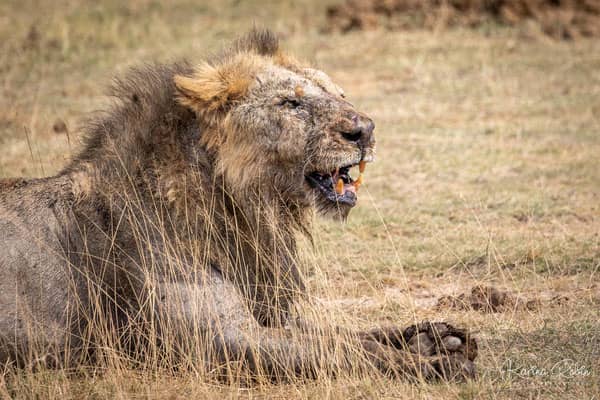The tourism sector in Kenya on 12th May woke up to the sad news of the death of one of their country’s ageing lions, believed to be one of the oldest in the world.
The 19-year-old lion named Loonkito according to wildlife officials in Kenya was speared to death by Masai warriors, when it strayed into a livestock grazing area.
Due to dwindling prey, wild-human conflicts are widely reported in Kenya, with predators especially big cats straying into human habitats to get easy prey.
Paul Jinaro, the spokesperson for Kenya Wildlife Service (KWS) told AFP news that the lion’s intrusion into livestock pen caused its demise.
“Loonkito, an iconic 19-year-old male lion, was speared to death by Maasai morans (warriors) after straying into a livestock pen in the outskirts of the famed Amboseli National Park, Kenya,” Jinaro told AFP.
He added that ageing lions find it extremely hard to catch wild prey on their own, and the last resort is to invade human territory for soft targets.
“A normal lion would go for wildlife inside the park. It was an old lion that had issues… getting prey on its own and livestock is easy prey,” Jinaro said.
It should be noted that African lions typically have a lifespan of up to 18 years in the wild, according to conservation group cats for Africa.
KWS in 2021 described Loonkito as a “legendary big cat warrior” who had defended his territory for over a decade, while conservation group Lion Guardians hailed Loonkito as “a symbol of resilience and coexistence.”
“It is with heavy hearts that we share the news of the passing of Loonkito (2004 – 2023), the oldest male lion in our ecosystem and possibly in Africa,” the non-profit entity wrote on Facebook.
Reports of wildlife encroaching on human habitats in Kenya have heightened in recent years as the animals find alternatives to dwindling prey in the wild, coupled with growing pressure from cities expanding into ancient migration and hunting grounds.
“People need to be sensitised on looking for a way to alert us and then we can take animals back to the parks,” KWS official Jinaro said.
Worrying trends
Wild-Human conflicts are not something new in Kenya. In July 2021, a lion caused panic after straying from its habitat in Nairobi National Park into a crowded neighbourhood during morning rush hour.
The park is located seven kilometres from Kenya’s capital, Nairobi and incidents of animals escaping the grassy plains and wandering into the chaotic metropolis of more than four million people are not unheard of.
In December 2019, a lion mauled a man to death just outside the park, while in March 2016 another cat was shot dead after attacking and injuring a nearby resident.
Just a month before that, in February 2016, two lions spent a day wandering through Kibera, a densely packed city slum, before returning to the park, and days later more lions were spotted in town.
Lion conservation experts have also attributed this intrusion into human territory to struggle for territory among these big cats. Accordingly, when young and strong male lions emerge in the wild, they kill the ageing ones, take over their territories and prides.
The deposed lucky ageing males which escape death are left with no option but to run away for the safety of their lives, straying into human territory.
Do you have a story in your community or an opinion to share with us: Email us at Submit an Article









